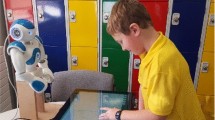Abstract
All changes are difficult and moving from face-to-face to online learning is not an exception. Nowadays, online students have many supports to ease their learning process due to the evolution of Virtual Learning Environments (VLE), the maturity of the pedagogical models used, and the vast experience of online teachers who design, create and deploy successful learning activities and accompany students through these activities. However, these supports are mainly centralized within the contexts of the VLE or the virtual classrooms. Therefore, new online learners should get the necessary habits to enter the VLE and the classrooms frequently. In this research we present an ongoing study in which robots are used as personalized companions of new students. Robots provide personal feedback to each student with the aim of promoting behavioral changes that facilitate the learning experience of new students and potentially reduce their dropout.
Access this chapter
Tax calculation will be finalised at checkout
Purchases are for personal use only
Similar content being viewed by others
Notes
References
Spolaôr, N., Benitti, F.B.V.: Robotics applications grounded in learning theories on tertiary education: a systematic review. Comput. Educ. 112, 97–107 (2017)
Sangrà, A.: A new learning model for the information and knowledge society: the case of the UOC. Int. Rev. Res. Open Distance Learn. 2(2), 152–167 (2002)
Hiemstra, R.: Self-Directed Learning. IACE Hall of Fame Repository (1994)
Grau-Valldosera, J., Minguillón, J.: Redefining dropping out in online higher education: a case study from the UOC. In: Proceedings of the 1st International Conference on Learning Analytics and Knowledge, pp. 75–80 (2011)
Clark, F., Sanders, K., Carlson, M., Blanche, E., Jackson, J.: Synthesis of habit theory. OTJR Occup. Particip. Heal. 27(1_suppl), 7S-23S (2007)
Andrews, B.R.: Habit. Am. J. Psychol. 14(2), 121–149 (1903)
Ryan, R.M., Deci, E.L.: Self-determination theory and the facilitation of intrinsic motivation, social development, and well-being. Am. Psychol. 55(1), 68 (2000)
Birnbaum, G.E., Mizrahi, M., Hoffman, G., Reis, H.T., Finkel, E.J., Sass, O.: What robots can teach us about intimacy: the reassuring effects of robot responsiveness to human disclosure. Comput. Human Behav. 63, 416–423 (2016)
Oinas-Kukkonen, H., Harjumaa, M.: Persuasive systems design: key issues, process model, and system features. Commun. Assoc. Inf. Syst. 24(1), 28 (2009)
Fogg, B.: A behavior model for persuasive design. In: ACM International Conference Proceeding Series, vol. 350 (2009)
Ham, J., Cuijpers, R.H., Cabibihan, J.-J.: Combining robotic persuasive strategies: the persuasive power of a storytelling robot that uses gazing and gestures. Int. J. Soc. Robot. 7(4), 479–487 (2015)
Minguillón, J., Conesa, J., Rodríguez, M.E., Santanach, F.: Learning analytics in practice: providing E-learning researchers and practitioners with activity data. In: Frontiers of Cyberlearning, pp. 145–167. Springer, Singapore (2018)
Chidambaram, V., Chiang, Y.-H., Mutlu, B.: Designing persuasive robots: how robots might persuade people using vocal and nonverbal cues. In: Proceedings of the Seventh Annual ACM/IEEE International Conference on Human-Robot Interaction, pp. 293–300 (2012)
Acknowledgments
This work has been partially supported by the eLearn Center of the UOC through the project titled “Botter: a personal robot for novel UOC students” and by European Commission through the project “colMOOC: Integrating Conversational Agents and Learning Analytics in MOOCs” (588438-EPP-1-2017-1-EL-EPPKA2-KA). This research has also been supported by Seidor Labs department of Seidor company, who, as a UOC’s technology provider, implemented the robots and the interaction between them and the UOC campus.
Author information
Authors and Affiliations
Corresponding author
Editor information
Editors and Affiliations
Rights and permissions
Copyright information
© 2021 The Editor(s) (if applicable) and The Author(s), under exclusive license to Springer Nature Switzerland AG
About this paper
Cite this paper
Conesa, J. et al. (2021). Towards the Use of Personal Robots to Improve the Online Learning Experience. In: Barolli, L., Takizawa, M., Yoshihisa, T., Amato, F., Ikeda, M. (eds) Advances on P2P, Parallel, Grid, Cloud and Internet Computing. 3PGCIC 2020. Lecture Notes in Networks and Systems, vol 158. Springer, Cham. https://doi.org/10.1007/978-3-030-61105-7_18
Download citation
DOI: https://doi.org/10.1007/978-3-030-61105-7_18
Published:
Publisher Name: Springer, Cham
Print ISBN: 978-3-030-61104-0
Online ISBN: 978-3-030-61105-7
eBook Packages: EngineeringEngineering (R0)




